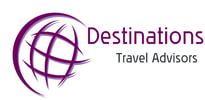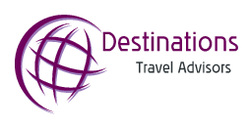Let's Talk About Money, Money, Money...
Before you Go
Prior to departure be sure you call your credit/debit card companies to advise them that you will be traveling outside the US. Check the expiration dates on your card(s) to ensure it is valid at least one month beyond your travel dates. Ask your local bank if they have a “corresponding” bank partner abroad that will not charge fees for ATM withdrawals. Also, inquire about any daily withdrawal limits.
There may be an international transaction fee (1-4%) charged for some credit/debit card purchases made outside the US. A few of the cards that don’t charge fees are Capital One, Hyatt Visa, British Airways Visa Signature, Chase Sapphire Preferred, Marriott Rewards Premier, Priority Club Select Visa, Continental Presidential Plus, American Express Platinum and Centurion cards.
To use ATMs abroad you may need an international PIN number. Check with your bank prior to traveling. In Europe and many other countries, most automatic machines (i.e. parking meters, highway tolls, ticket kiosks, etc.) no longer accept US credit/debit cards unless they’re imbedded with a smartchip. The same is true for some smaller merchants and restaurants, and the list continues to expand. For these transactions, and similar situations, it is recommended that you have Euros on hand.
We recommend that you secure about $400 USD converted to Euro (or to the currency of the country you are visiting) from your local bank or at the TravelEx (Foreign Exchange) Desk in the airport. (check xe.com for the most current rates to make sure you are getting a good deal) This will get you to your hotel and should last for at least a day or two. Make sure you get some small bills for tipping the assistants upon arrival and the bellman/staff.
After you Arrive
You will get the best rate of exchange when you use ATM's. As in the US, ATM's are located almost everywhere. Be sure to have your PIN code and that your ATM cards have the CIRRUS, Pulse or STAR Network logo on the back. You will need to look for ATM's that have one of these logos on them. Ask your banking institution for more information. If you are sailing on a cruise ship there should be an ATM on board - but it likely will give out USD, not Euros.
In lieu of an ATM you can exchange at local banks, which usually have fair rates, or at hotel and cruise ship front desks, although they will probably have the worst rates.
We don't recommend travelers checks, as they are not widely accepted anymore, and may be more hassle than solution.
Before you Go
Prior to departure be sure you call your credit/debit card companies to advise them that you will be traveling outside the US. Check the expiration dates on your card(s) to ensure it is valid at least one month beyond your travel dates. Ask your local bank if they have a “corresponding” bank partner abroad that will not charge fees for ATM withdrawals. Also, inquire about any daily withdrawal limits.
There may be an international transaction fee (1-4%) charged for some credit/debit card purchases made outside the US. A few of the cards that don’t charge fees are Capital One, Hyatt Visa, British Airways Visa Signature, Chase Sapphire Preferred, Marriott Rewards Premier, Priority Club Select Visa, Continental Presidential Plus, American Express Platinum and Centurion cards.
To use ATMs abroad you may need an international PIN number. Check with your bank prior to traveling. In Europe and many other countries, most automatic machines (i.e. parking meters, highway tolls, ticket kiosks, etc.) no longer accept US credit/debit cards unless they’re imbedded with a smartchip. The same is true for some smaller merchants and restaurants, and the list continues to expand. For these transactions, and similar situations, it is recommended that you have Euros on hand.
We recommend that you secure about $400 USD converted to Euro (or to the currency of the country you are visiting) from your local bank or at the TravelEx (Foreign Exchange) Desk in the airport. (check xe.com for the most current rates to make sure you are getting a good deal) This will get you to your hotel and should last for at least a day or two. Make sure you get some small bills for tipping the assistants upon arrival and the bellman/staff.
After you Arrive
You will get the best rate of exchange when you use ATM's. As in the US, ATM's are located almost everywhere. Be sure to have your PIN code and that your ATM cards have the CIRRUS, Pulse or STAR Network logo on the back. You will need to look for ATM's that have one of these logos on them. Ask your banking institution for more information. If you are sailing on a cruise ship there should be an ATM on board - but it likely will give out USD, not Euros.
In lieu of an ATM you can exchange at local banks, which usually have fair rates, or at hotel and cruise ship front desks, although they will probably have the worst rates.
We don't recommend travelers checks, as they are not widely accepted anymore, and may be more hassle than solution.

